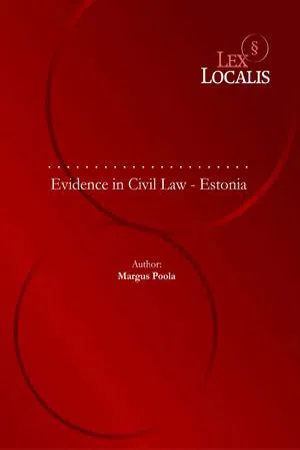Evidence in Civil Law - Estonia
About this book
Since Estonia regained its independence on 20 August 1991 Estonian civil procedure has been gradually developed from the civil procedure of Estonian SSR to the modern civil procedure rules in force today. The current code of civil procedure was adopted on 20 April 2005 and came into force in 1 January 2006. Since coming into force several changes have been made to the current code with significant changes coming into force on 1 January 2009. Estonian civil procedure is mainly based on the adversarial principle, except for some specific cases and proceedings on petition where the inquisitorial principle is used. Deriving from this the parties are in most cases free to decide on what evidence to submit and whether to submit evidence at all. While the court may ask the parties to submit evidence, they are not required to do so. The situation is different in cases based on the inquisitorial principle. Estonian civil procedure does not impose many restrictions as to the kind of evidence that can be submitted. Virtually anything that can be reproduced in some way may be submitted as documentary evidence and any person who has knowledge about the facts of the case may be heard as a witness. Even the parties may be heard under oath. The Estonian Code of Civil Procedure does not set out many rules on how to evaluate the evidence submitted. The basic rule is that the court has to assess the evidence impartially and as a whole and not give any preference to any particular piece of evidence.
Frequently asked questions
- Essential is ideal for learners and professionals who enjoy exploring a wide range of subjects. Access the Essential Library with 800,000+ trusted titles and best-sellers across business, personal growth, and the humanities. Includes unlimited reading time and Standard Read Aloud voice.
- Complete: Perfect for advanced learners and researchers needing full, unrestricted access. Unlock 1.4M+ books across hundreds of subjects, including academic and specialized titles. The Complete Plan also includes advanced features like Premium Read Aloud and Research Assistant.
Please note we cannot support devices running on iOS 13 and Android 7 or earlier. Learn more about using the app.
Information
Table of contents
- Evidence in Civil Law - Estonia by Margus Poola
- Abstract
- Keywords
- Margus Poola, MA
- Introduction
- Contents
- Fundamental Principles of Civil Procedure
- General Principles of Evidence Taking
- Evidence in General
- General Rule on the Burden of Proof
- Written Evidence
- Witnesses
- Taking of Evidence
- Costs and Language
- Unlawful Evidence
- Regulation No 1206/2001
- References
